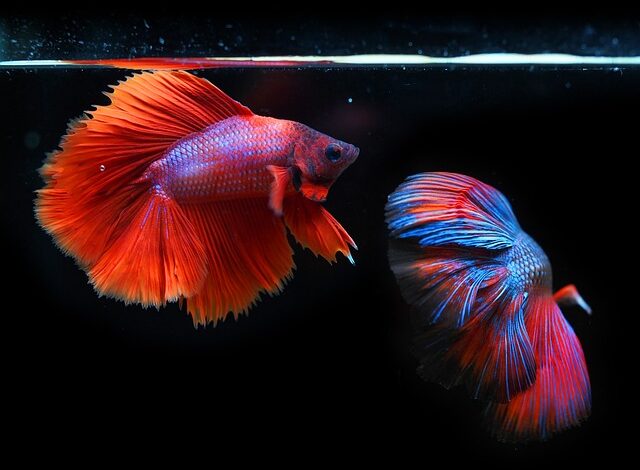How Long Can Betta Fish Go Without Food: Essential Care Tips

How Long Can Betta Fish Go Without Food: Essential Care Tips
Betta fish, known for their vibrant colors and flowing fins, are a popular choice for aquarium enthusiasts. While they are relatively easy to care for, questions about their feeding needs often arise, particularly regarding how long they can go without food. Understanding the dietary requirements and limits of your Betta fish is crucial to ensuring their health and well-being. In this guide, we’ll explore how long Betta fish can go without food, factors affecting their survival, and tips for maintaining their health. Read Also: Do Fish Pee? What You Need To Know
Understanding Betta Fish Dietary Needs
Natural Diet
In the wild, Betta fish are carnivorous, feeding on insects, larvae, and small crustaceans. This protein-rich diet supports their high-energy lifestyle and vibrant coloration.
Captive Diet
In captivity, Betta fish should be fed a balanced diet that includes high-quality Betta pellets, frozen or live foods like brine shrimp and bloodworms, and occasional vegetable matter. This variety ensures they receive all the necessary nutrients.
Feeding Frequency
Typically, adult Betta fish should be fed once or twice a day, with small portions that they can consume within a few minutes. Overfeeding can lead to health issues such as bloating and swim bladder disorders.
How Long Can Betta Fish Go Without Food?
Short-Term Fasting
Betta fish can survive without food for short periods, making them relatively low-maintenance pets for short trips or busy days.
- 3-4 Days: Betta fish can comfortably go without food for 3-4 days without experiencing significant health issues. This duration is common for short vacations or unexpected busy periods.
- Up to 7 Days: In some cases, healthy adult Betta fish can survive up to 7 days without food. However, this should not be a regular practice, as prolonged fasting can weaken their immune system and lead to stress.
Long-Term Survival
While Betta fish can endure short-term fasting, longer periods without food can be detrimental.
- Beyond 7 Days: Extending beyond a week without food can cause severe health problems, including malnutrition, weakened immune response, and increased susceptibility to diseases. It is generally advised to avoid leaving your Betta fish unfed for more than a week.
Factors Affecting Survival Without Food
Health and Age
The overall health and age of your Betta fish play significant roles in their ability to withstand fasting. Younger, healthier fish have better reserves and resilience compared to older or sickly fish.
Water Quality
Maintaining optimal water quality is crucial. Clean, well-filtered water helps reduce stress and supports the overall health of your Betta fish, making them more resilient during short periods without food.
Tank Environment
A well-maintained tank with proper temperature, pH levels, and hiding spots can reduce stress and help your Betta fish conserve energy, indirectly supporting them during fasting periods.
Tips for Maintaining Betta Fish Health During Absences
Using Automatic Feeders
If you plan to be away for more than a few days, consider investing in an automatic fish feeder. These devices can dispense pre-measured amounts of food at regular intervals, ensuring your Betta fish are fed even in your absence.
Enlisting Help
For extended absences, asking a friend or neighbor to feed your Betta fish can be a reliable option. Provide clear instructions on feeding amounts and frequency to avoid overfeeding.
Prepping the Tank
Before leaving, perform a partial water change and clean the tank to ensure optimal water quality. This helps minimize stress and maintains a healthy environment for your Betta fish.
Frequently Asked Questions
- Can Betta fish survive for a week without food?
Yes, healthy adult Betta fish can survive for up to a week without food. However, it is not recommended to make this a regular practice as it can lead to stress and health issues over time.
- What should I do if I need to leave my Betta fish for more than a week?
Consider using an automatic fish feeder or asking a friend or neighbor to feed your Betta fish. Ensure the tank is clean and the water quality is optimal before you leave.
- How often should I feed my Betta fish?
Feed your Betta fish once or twice a day with small portions that they can consume within a few minutes. Overfeeding can cause health problems, so it’s important to avoid giving too much food.
- What are the signs of overfeeding in Betta fish?
Signs of overfeeding include bloating, lethargy, and uneaten food in the tank. Overfeeding can lead to swim bladder disorders and water quality issues, so it’s crucial to feed appropriate amounts.
- How can I ensure my Betta fish are healthy during short absences?
Ensure the tank is clean, the water quality is good, and consider using an automatic feeder if you’ll be away for more than a few days. Reducing stress and maintaining a healthy environment are key to their well-being.
Conclusion
Understanding how long Betta fish can go without food and taking steps to maintain their health during absences is crucial for any Betta owner. While Betta fish can survive short periods without food, it’s essential to plan ahead for longer absences to ensure their well-being. By providing a balanced diet, maintaining optimal water quality, and using tools like automatic feeders, you can keep your Betta fish healthy and thriving. Happy fish keeping!




